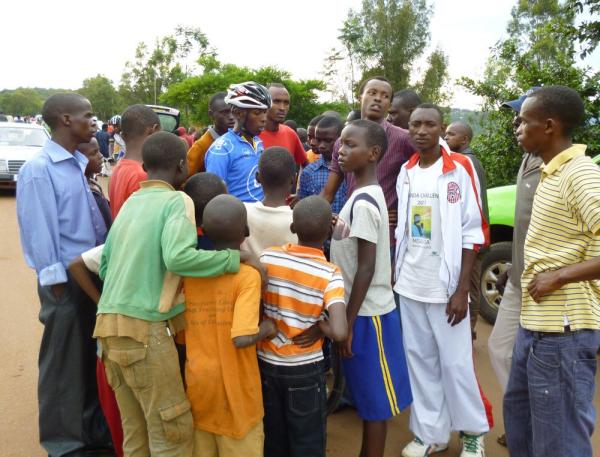Adrien Niyonshuti, from hell to hope in Rwanda
An overall victory at the Tour of Rwanda would be a symbol for his people

A thick crowd was held back by barriers closing the road in Rwamagana, even after the podium presentation, when their hero finally appeared wrapped in a polka-dot jersey. Adrian Niyonshuti, a professional with the South African continental team MTN Qhubeka, is both the toast of this town where the Tour of Rwanda stopped after Monday morning's half stage and the favourite for overall victory.
The stage was dedicated to the 800,000 victims of the genocide. On the asphalt where the finish line was drawn, in Kicukiru district, more than 5,000 people died, some of which were a large fraction of Niyonshuti's family.
"Adrien is really popular in the country," Jonathan Boyer, the US coach of Team Rwanda, told Cyclingnews. "We can say 80% of the people know him and often recognise him in the street. He is surely the most famous Rwandan, after the president [Paul Kagame] of course."
On the line, the 24-year-old Niyonshuti was outsprinted only by the race's leader, Kiel Reijnen, from Team Type 1. He was the people's winner, however.
In his home town, Niyonshuti was hugged by people he sometimes didn't know, hiding his fatigue and his usual demeanour behind a smile as large as possible. He took a few minutes to embrace two ladies named Jeanne who were waiting in the VIP area, a friend in a wheelchair, and his sister. His mother was not here, but may attend the final stage Saturday in Kigali with, perhaps, her son in yellow.
That's more or less all of the family Niyonshuti has left in the area: his father and six of his brothers died in the genocide 17 years ago.
The Rwandan icon encapsulates the horror, the fears, the chance for redemption and the hopes of his countrymen. Through cycling he has started a new life. He lives in Johannesburg and doesn't like to be home very much, because of the pressure and a painful history he tries to keep to himself.
Get The Leadout Newsletter
The latest race content, interviews, features, reviews and expert buying guides, direct to your inbox!
An overall success for Niyonshuti at the Tour of Rwanda would be something beyond the sport, a symbol, another merciful release.
More pragmatically, an ultimate yellow jersey would help the Project of Rwanda and the national cycling federation which desperately needs more advertising and sponsors. The two Rwandan squads in the bunch will race for their usual leader, who will be supported basically by a third of the peloton during the race.
Since Rwanda's toughest competitors, the teams from Eritrea and Morocco, didn't start, Niyonshuti has a solid chance to make his nation's dream come true. "I wish to take the yellow jersey tomorrow [Tuesday]", he said after stage 2 to Kigali. "The leader looks strong but we will see if he is really a good climber."
Reijnen, Team Type 1's revelation of the race and winner of three stages, might be Niyonshuti's bête noire and grant an epic battle though the rolling hills of the country.
Niyonshuti has won the Tour of Rwanda in 2008, but the race was not in the UCI calendar at that time. He took third in 2009 and eighth last year. A better performance may have helped him to qualify for the road race at the 2012 Olympics, but his country did not qualify any spots for the road events.
Next Summer, he will be in London anyway, as a mountain biker. Niyonshuti worked hard this year to capture points on South African events and gain a place for the Olympic Games, a supreme goal for his people carries him on into the Games.
Monday afternoon, at the second half stage, thousands of supporters were devastated to see him break a spoke in his front wheel and miss the victory by two seconds. This segment of the course was dedicated to the 800,000 victims of the genocide. On the asphalt where the finish line was drawn, thousands of people died and locals say blood covered the stretch of road that now celebrates the sport of cycling.